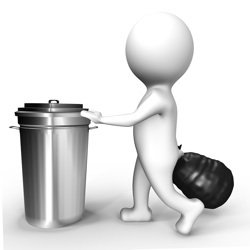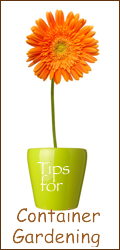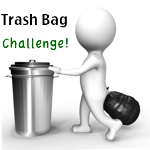Green Trash
The "One Trash Bag" Challenge
The Green Trash Challenge. How low can YOU go?

You can tell a lot about a family by what's in their garbage... and by how much trash is at the end of the drive on collection day.
If you want your trash to say good things about you, take the trash bag challenge.
By adopting a few eco friendly living habits you can keep TONS of garbage out of the landfill.
Think you can get down to 1 Kitchen Bag of trash per month?
Between composting, recycling and keeping an eye on what comes into the house in the first place, it's surprising how little trash there is left to go to the landfill.
We have long since whittled our garbage production down to 1 green garbage bag per month and it's been amazingly easy. We've learned a LOT about what can be recycled... and what can't.
Because there were fewer and fewer things in the garbage, we really started to notice what we were still throwing out.
Over the months we've made some adjustments and noticed a big drop in the amount of garbage we're collecting. I think we're ready to commit to the 1 Kitchen Bag Per Month Challenge and this is the page where we'll let you know how the green trash experiment goes.
Start your own Green Trash page here.
Our new "green trash" goal is to produce no more than 1 kitchen-catcher-sized bag of trash per month.
We're a family of 2 adults, home 95% of the time since we both work from home. As mentioned before we are omnivores (eat meat, grains, vegetables). We've always lived environmentally consciously and have lived for decades in remote, environmentally sensitive and organic surroundings.
We're real people who have lots of bad habits but try to keep things balanced by having good habits too.
Here's How to Get Started
Green Trash - Recycle
Recycle everything your recycle facility will accept. It's easy to keep things tidy around the house if you invest in a home recycling center but you can use cardboard boxes, buckets, bins or bags to sort the various materials.
Tuck a list of what you can recycle under a fridge magnet and start right now to sort recyclables from the trash.
Begin with the things you know your recycling facility will accept. Look around and ask questions about acceptable materials when (if) you visit the center. In urban locations (many of which have great recycling programs), check the city website for local recycling guidelines.
Green Trash - Compost
Reduce your trash by 1/3 by composting.
Collect all of your vegetable and fruit scraps, coffee grounds, tea bags, egg shells, dryer lint, etc. for composting. Here's a list of kitchen compostable materials.
It's not necessary to invest in a composter. If you have any garden space; flower beds, vegetable beds, walkway edging, you can dig a hole 10 to 12 inches (19cm) deep, drop your compostings into the hole and cover them up (avoid disturbing the roots of nearby plantings), that's it.
If you don't have any garden space you can start a worm composter to clean up your kitchen scraps and even your junk mail.
We'll be trying the Bokashi Bucket - SCD Probiotics K100 All Seasons Indoor Composter Kit
this summer and let you know how that works for us.
Green Trash - Keep Track
The next time you change the trash bag, mark a "T" on the calendar and every time you change the bag, mark the "T" on the date.
It's easy to keep track of how much trash leaves the house this way. It's understood that every time a "T" appears on the calendar, the bag was changed so it marks the day the old bag "went out" as well as the day a new bag was started.
Once your page is built you'll be able to make updates and others will be able to comment.
Green Trash - Things I've Learned So Far
- This challenge will be easier for a vegetarian - We are not vegetarian, and disposing of meat wrappings and scraps has presented some issues. No matter how well I rinse the plastic and other packaging, it starts to stink after a few days. I've addressed the issue by using smaller bread bags for the trash so that it can be emptied more frequently into the kitchen bag (which is kept in the shed).
- Meat Scraps - As mentioned above, meat handling brings up some issues and putting fat/bones/skin in the garbage is simply NOT the solution. Here's how I
solved this for my situation. We live on the Pacific Ocean and my husband loves fishing and crabbing in his little rowing skiff. I freeze the food scraps in a food
container and add scraps as we generate them. Joe uses them for the crab trap or the fishing hook. The Bokashi Bucket
promises to be a simple solution to the issue as well.
- Paper products prevail - Paper towels, tissues, muffin wrappers, those sorts of things, take up most of the room in there. It makes me a lot more aware of how many paper products we use.
I started been using the Skoy cloth
about 6 months agoto reduce my use of paper towels. I LOVE them and have given about a dozen to friends and family.
- Packaging - When I'm shopping I pay more attention to packaging now (which, by far, made up the bulk of our trash before the challenge). I tend to buy products with minimal packaging and stick to materials that I know the recyclers will take.
- Products - For the most part I think "less is more" in the product buying area but there are a few products that will ease the transition and reduce your need for disposable products including skoy sponges, biodegradable bags. a composter and a recycle bin.
.
How Low Can YOU Go?
Take the Challenge!
Tell us about yourself and any others that live with you, about your good trash habits and the ones you plan to change.
Do you think you can get down to 1 big garbage bag, 1 kitchen bag, maybe you think you can do better?
Build your page today declaring that you'll reduce your trash output.
Once your page is published, bookmark it so you can come back and update us on your progress. Share the address with friends and they'll be able to comment too.
Don't forget to include any tips, ideas or products you've learned about that you think we might all benefit from.
(In order to get your own page, the submission should be at least 350 words in length. Shorter submissions may be included on pages with multiple others.)
Visitors to our Green Trash page may also be interested in the following pages.
Help the Environment by RecyclingWhat Can You Recycle










